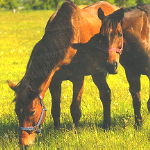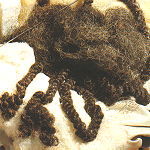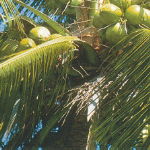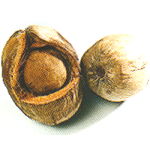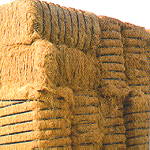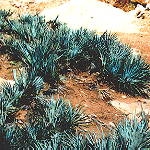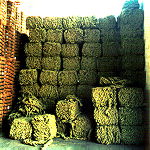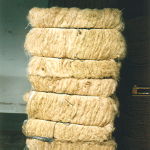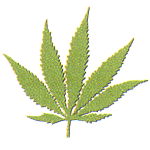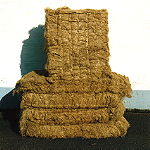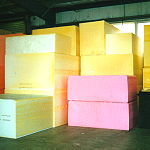 |
| Horsehair
Horsehair is a natural product whose advantages are only completely developped in the spinning mill. Here the hair is washed, mixed and spun. It follows a steam bath in a steam boiler of about 2 hours at 120 degrees centigrade. After this procedure the damp hair gets a drying of 90 minutes in a steam belt. According to the wish of the customer the spun product is unburred (loose design) or untwisted (reversed hanks). But mostly the horsehair is mechanically needled to fleece. Weights and closeness are produced accordingly to the customers wish. Horsehair is particularly shape-retaining, light, handy and has a smooth, supporting surface. It is contoured and has the hygienic feature to take take up the perspiration and dampness of the body which is developped when lying and to carry it away to the outside. This way a healthy bed atmosphere with an undisturbed spiration of the skin is created. Because of its hygroscopic feature horsehair can take up liquid about 20 % of its dry weight without having a damp effect. According to RAL 399C4 we use the following hair qualities :
Coconut
This hard fibre from Sri Lanka is produced from the shell of the coconut. It protects the fruit from the scorching sun and damage when falling down. The fibres are cut of the kernel and put about 5-6 months into seawater to over-ret. Now all impurities seperate from the resistant coconut fibres. It follows a washing procedure and the drying through the sun. According to their quality the fibres are spun, dyed or baled. Then the semifinished product is transported to the next seaport and packed in containers. After a seajourney of 4-6 weeks the container vessels reach their destination port in North Europe. Local motor carriers transport the containers by trucks to our factory in Eberbach. Specific features of the coconut fibre:
Palmfibres
According to RAL 399C4 the palmfibres is an upholstery out of the leaf fibres of the African dwarfpalmtree (chamaerops humilis). Our supply source of this vegetable raw material is mainly Marocco. To gain the palmfibres the leaves are cut and shredded with a sickle. The damp fibres are collected in layers and dried by the sun on great fields in the surrounding. Then follows the spinning and the fibres are drilled to about 3 metres long hanks. Packed in bales à 80 kg they are transported per ship to North Europe. There they are further processed as upholster mat on a jute carrier or the hanks are opened by a plucking machine. The main applications for the palmfibres are the upholstery or restoration of seats and the production of mattresses. The specific features of this natural fibre are:
Sisal
This is a plant fibre from the leaves of the agave (agave sisalana or agave rigada). It comes from Africa (Madagascar, Kenya, Tanzania), India or Brazil. Needled to fleece this material is extremely well qualified as upholster carrier on a spring core. The fibre has no own smell at all and is particularly soft, tenacious and clean.
Hemp
In Germany the state-sponsored natural fibre hemp is controlled organically grown on fallow areas. It has no special demand on the soil and doesn't need any plant protective at all. The special fibre structure of hemp is very cellular and provides quick drying, extraordinarily good absorption of humiditiy and airing. Without synthetic additions or chemical devices it is mechanically needled to natural fleece. Especially proven for insulating and clothes more and more producers of natural mattresses are interested in this bastfibre.
Foam
Polyurethanfoams based on polyether distinguishes as upholster material by being highly elastic and optimally open celled. The good thermal insulation of the material on the one hand and the high airing on the other hand provide an excellent seat resp. lying atmosphere. The features of the PUR soft foams can be produced according to the requirements, e.g. highly portative and supporting, relieving from pressure or extremely soft. Important for the right choice of the foam are the data specific gravity, resistance to crushing, tensile strength and breaking elongation. |
| Heinrich Reibel
GmbH, Gütschowstraße 6, D-69412 Eberbach, Tel. (+49) 6271 2481, Fax (+49) 6271 2460 |
